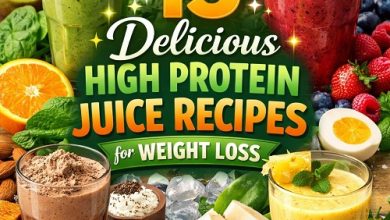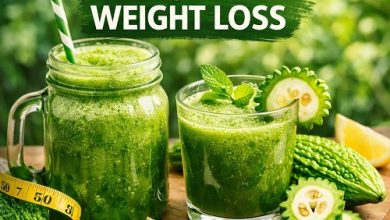Why Your Two-Egg Breakfast Isn’t Giving You Enough Protein — And What to Eat Instead!

For years, eggs have held the crown as the go-to breakfast food. They’re quick, affordable, and packed with nutrients. Whether fried, scrambled, or poached, eggs have long been celebrated as a perfect source of morning protein.
But here’s the catch — if you’re eating just two eggs for breakfast, you’re probably not getting as much protein as you think. In fact, that seemingly “healthy” start might be leaving your muscles underfed and your energy levels lower than they should be.
Let’s break down why two eggs often fall short of your body’s protein needs, how that affects your health and fitness goals, and what you should eat instead for a truly satisfying, protein-rich morning meal.
How Much Protein Do You Actually Get from Two Eggs?
A large egg contains about 6 to 7 grams of protein. So, two eggs give you roughly 12 to 14 grams.
At first glance, that sounds pretty good — especially since eggs are a complete protein, meaning they provide all nine essential amino acids your body needs. However, the problem isn’t the quality of egg protein — it’s the quantity.
Most adults need far more protein at breakfast than two eggs alone can offer.
How Much Protein Do You Need at Breakfast?
According to research, adults should aim for about 1.2 to 2.0 grams of protein per kilogram of body weight per day, depending on activity level, age, and fitness goals.
For example:
- A 60 kg (132 lb) person should aim for 72–120 grams per day.
- A 75 kg (165 lb) person should aim for 90–150 grams per day.
Ideally, that protein should be evenly distributed throughout the day — not all loaded into lunch or dinner.
That means you should be getting around 25–35 grams of protein at breakfast to kickstart muscle repair, keep blood sugar stable, and prevent cravings later.
Now, compare that target to your two-egg breakfast — you’re getting only about 12 grams, less than half of what your body needs to perform optimally.
Why Protein at Breakfast Is So Important
Skipping protein in the morning doesn’t just make you hungry sooner — it can affect your metabolism, muscle growth, and even your mood. Here’s why that morning protein matters so much:
1. It Boosts Muscle Maintenance and Growth
After fasting overnight, your muscles are ready for repair and rebuilding. A protein-rich breakfast helps trigger muscle protein synthesis, the process your body uses to build and maintain muscle tissue.
Without enough protein, your body might start breaking down muscle instead of building it — especially if you’re active or over 40, when natural muscle loss accelerates.
2. It Keeps You Full and Energised
Protein slows digestion and stabilises blood sugar levels. Compared to a carb-heavy meal (like toast, cereal, or pancakes), a high-protein breakfast helps you stay full for hours and prevents mid-morning crashes.
3. It Aids in Weight Management
Several studies have shown that starting your day with adequate protein can reduce cravings and calorie intake later in the day. It also boosts your metabolism slightly, helping your body burn more calories at rest.
4. It Supports Hormonal and Cognitive Function
Protein provides amino acids that are precursors to important neurotransmitters — like serotonin and dopamine — that affect mood, focus, and motivation. Not enough protein early in the day can lead to sluggishness or irritability.
Why Two Eggs Alone Don’t Cut It
While eggs are nutrient-dense, they simply don’t offer enough volume of protein when eaten on their own — unless you’re eating four or more (which isn’t ideal for everyone due to calorie and cholesterol considerations).
Here are a few key reasons your two-egg breakfast may be falling short:
1. It Lacks Protein Balance
Two eggs (12 grams protein) with a slice of toast (about 3 grams) still only give you 15 grams total — not enough for muscle repair or long-term satiety.
2. It’s Often Missing Supporting Nutrients
Many people eat their eggs with refined carbs (white bread, croissants, or juice) rather than nutrient-dense, protein-boosting sides like Greek yoghurt, cottage cheese, or beans.
3. It Can Lead to Mid-Morning Hunger
Because it’s low in both protein and fibre, a two-egg breakfast often leaves you hungry by 10 a.m. That’s when cravings for sugary snacks or extra coffee start to creep in.
4. It Doesn’t Support Active Lifestyles
If you exercise regularly or have physically demanding days, two eggs are simply not enough to meet your body’s post-recovery or performance needs.
The Protein Gap: Why It Matters
Let’s visualise this “protein gap.”
| Breakfast | Protein (approx.) |
| 2 eggs | 12 g |
| Add toast | +3 g = 15 g |
| Recommended target | 25–35 g |
You’re missing about 10–20 grams of protein — the difference between staying full and alert or feeling tired and hungry within hours.
That’s why balancing your breakfast with additional protein-rich foods is so important.
What to Eat Instead: Smart Protein-Packed Breakfast Upgrades
You don’t have to ditch eggs altogether — they’re still an excellent base. But it’s time to upgrade that breakfast plate.
Here are some delicious, high-protein breakfast combinations that deliver the nutrients your body actually needs:
1. Eggs + Greek Yoghurt Bowl
- 2 eggs (12 g)
- 150 g Greek yoghurt (15 g)
- 1 tablespoon chia seeds (2 g)
- ½ cup berries + honey (1 g)
✅ Total: ~30 grams of protein
This combo balances savoury and sweet while offering probiotics, calcium, and antioxidants. A great choice if you want variety and gut-friendly benefits.
2. Scrambled Eggs + Cottage Cheese + Veggies
- 2 eggs (12 g)
- ½ cup cottage cheese (14 g)
- Spinach, mushrooms, or peppers (2 g)
✅ Total: ~28 grams of protein
Cottage cheese adds casein protein, which digests slowly to keep you full longer. Mix it into your eggs after cooking for a creamy, high-protein twist.
3. Omelette with Turkey or Smoked Salmon
- 2 eggs (12 g)
- 2 oz turkey or smoked salmon (12–14 g)
- A sprinkle of low-fat cheese (3 g)
✅ Total: ~27–30 grams of protein
Lean meats and fish make a huge difference in hitting your protein goal. Plus, smoked salmon adds heart-healthy omega-3 fats.
4. Protein Smoothie with Eggs (or Powder)
If you prefer a lighter meal:
- 1 scoop protein powder (20–25 g)
- ½ banana
- 1 tablespoon peanut butter (4 g)
- Almond milk or Greek yoghurt base
✅ Total: ~30–35 grams of protein
This is perfect for busy mornings or post-workout recovery — portable, fast, and balanced.
5. Eggs on Wholegrain Toast + Avocado + Protein Side
- 2 eggs (12 g)
- Wholegrain toast (4 g)
- 2 tablespoons hummus or tofu slices (6–8 g)
✅ Total: ~25–30 grams of protein
A plant-forward meal rich in fibre, healthy fats, and complete protein — perfect for vegetarians.
6. High-Protein Pancakes or Oats
Swap traditional flour-based breakfast foods for protein-rich alternatives:
- Protein oats (made with milk, chia seeds, and whey powder)
- Protein pancakes (blend oats, eggs, and cottage cheese)
✅ Total: 30–35 grams of protein
These options keep your breakfast comfort foods intact while giving your muscles the nourishment they crave.
How to Build a Balanced, Protein-Filled Breakfast Plate
To hit your protein target without overthinking it, follow this simple formula:
🥚 1. Base Protein (20–25g):
Choose eggs, Greek yoghurt, protein powder, cottage cheese, lean meats, or tofu.
🥑 2. Supporting Protein (5–10g):
Add nuts, seeds, milk, cheese, beans, or whole grains.
🍓 3. Colourful Carbs and Fibre:
Include fruits, vegetables, or oats for energy and digestion.
🧂 4. Healthy Fats:
Use olive oil, avocado, or nut butter to support hormone and brain health.
What Happens When You Finally Get Enough Protein in the Morning
When you start hitting that 25–35g mark at breakfast, you’ll notice the difference quickly:
✅ 1. Steady Energy
No more crashing at 11 a.m. — you’ll feel more alert and focused throughout the day.
✅ 2. Fewer Cravings
High-protein meals reduce the hunger hormone ghrelin and boost leptin, which helps you feel full and satisfied longer.
✅ 3. Improved Muscle Tone
Combined with resistance training, adequate morning protein supports lean muscle growth and recovery.
✅ 4. Better Weight Control
People who eat more protein early in the day tend to consume fewer calories overall and maintain healthier body compositions.
✅ 5. Enhanced Mood and Productivity
Protein stabilises blood sugar and fuels neurotransmitter production, helping you think more clearly and stay positive.
Common Protein Mistakes People Make at Breakfast
Even when people try to eat more protein, these common errors often sabotage results:
❌ 1. Counting Calories Instead of Nutrients
A low-calorie breakfast (like just fruit or cereal) might sound healthy, but it lacks essential amino acids and fats that sustain you.
❌ 2. Relying on Carbs
Toast, bagels, or juice are primarily carbohydrates. Without enough protein, your blood sugar spikes and crashes quickly.
❌ 3. Avoiding Dairy or Meat Without Replacements
If you’re vegan or lactose-intolerant, it’s crucial to find alternate protein sources like lentils, tofu, tempeh, or pea protein shakes.
❌ 4. Underestimating Portions
A “small” serving of yoghurt or nuts might look good on paper but often doesn’t provide enough protein to matter.
How to Boost Protein Without Overeating
You don’t need to double your calories to double your protein. Here are some smart ways to increase protein without bulking up your plate too much:
- Use Greek yoghurt instead of regular yoghurt (almost double the protein).
- Add chia, hemp, or flax seeds to smoothies or oatmeal.
- Replace milk with high-protein versions like soy or pea milk.
- Snack on boiled eggs or edamame.
- Mix cottage cheese or whey into pancake or oatmeal batter.
These small tweaks add up quickly — helping you reach that optimal protein range without fuss.
The Bottom Line: Two Eggs Are a Great Start — But Not Enough
Eggs are an incredible superfood — rich in vitamins, minerals, and high-quality protein. But if you’re stopping at two, you’re not giving your body enough fuel to perform at its best.
A balanced breakfast with 25–35 grams of protein sets you up for stable energy, sharper focus, better appetite control, and stronger muscles.
So next time you crack those eggs, remember: they’re the foundation, not the full meal. Pair them with Greek yoghurt, cottage cheese, smoked salmon, or a protein smoothie — and you’ll turn a simple breakfast into a truly powerful start to your day.




